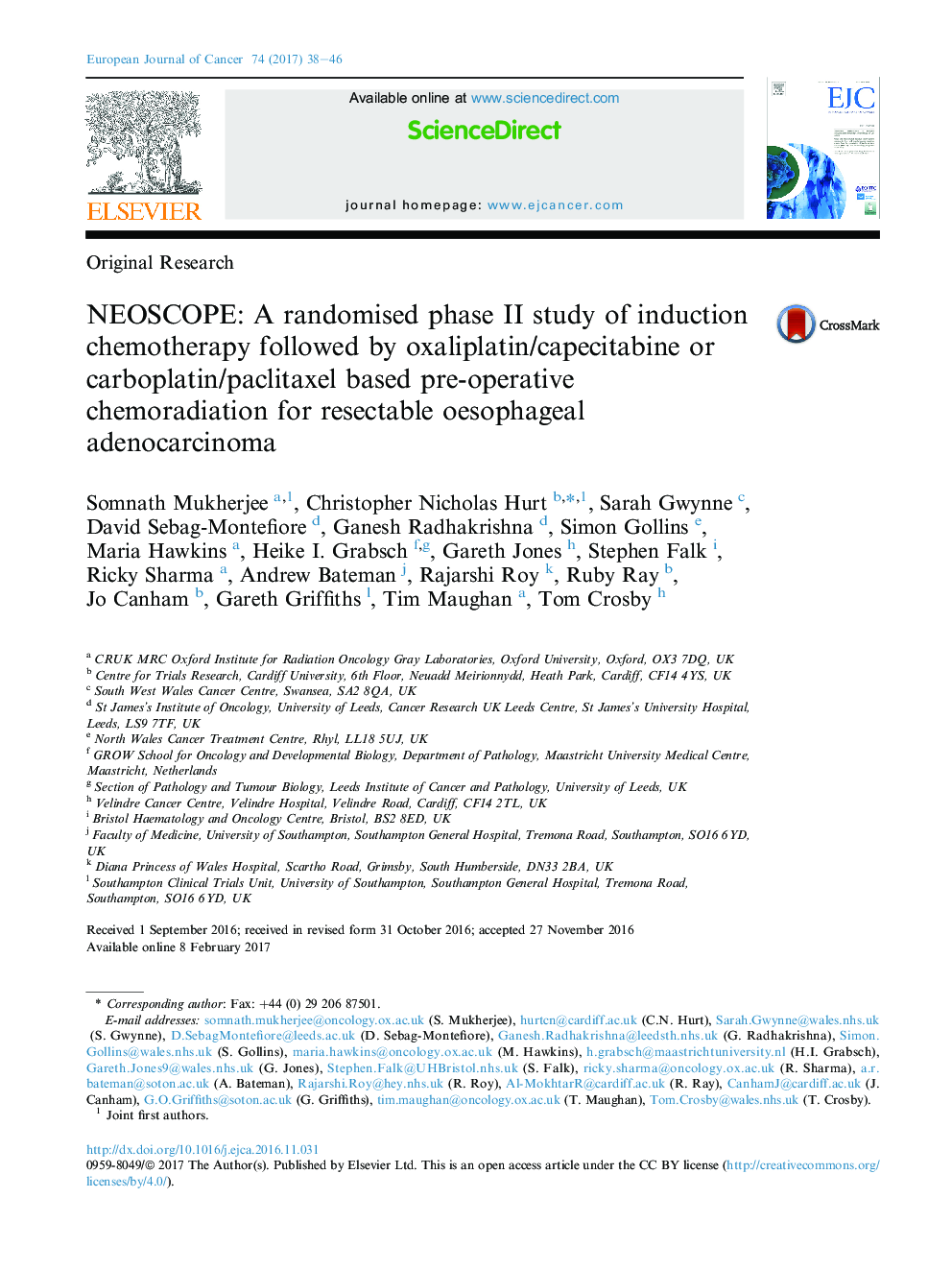| کد مقاله | کد نشریه | سال انتشار | مقاله انگلیسی | نسخه تمام متن |
|---|---|---|---|---|
| 5526368 | 1547058 | 2017 | 9 صفحه PDF | دانلود رایگان |

- Oxaliplatin-capecitabine (OxCap) and carboplatin-paclitaxel (CarPac) based neo-adjuvant chemoradiotherapy (nCRT) have shown promising activity in localised, resectable oesophageal cancer.
- A randomised phase II 'pick a winner' trial was conducted to assess which regimen to take forward to a phase III trial.
- Both regimens were well tolerated. Only CarPacRT passed the predefined pathological complete response (pCR) criteria for further investigation.
BackgroundOxaliplatin-capecitabine (OxCap) and carboplatin-paclitaxel (CarPac) based neo-adjuvant chemoradiotherapy (nCRT) have shown promising activity in localised, resectable oesophageal cancer.Patients and methodsA non-blinded, randomised (1:1 via a centralised computer system), 'pick a winner' phase II trial. Patients with resectable oesophageal adenocarcinoma â¥Â cT3 and/or â¥Â cN1 were randomised to OxCapRT (oxaliplatin 85 mg/m2 day 1, 15, 29; capecitabine 625 mg/m2 bd on days of radiotherapy) or CarPacRT (carboplatin AUC2; paclitaxel 50 mg/m2 day 1, 8, 15, 22, 29). Radiotherapy dose was 45 Gy/25 fractions/5 weeks. Both arms received induction OxCap chemotherapy (2 Ã 3 week cycles of oxaliplatin 130 mg/m2 day 1, capecitabine 625 mg/m2 bd days 1-21). Surgery was performed 6-8 weeks after nCRT. Primary end-point was pathological complete response (pCR). Secondary end-points included toxicity, surgical morbidity/mortality, resection rate and overall survival.StatisticsBased on pCR â¤Â 15% not warranting future investigation, but pCR â¥Â 35% would, 76 patients (38/arm) gave 90% power (one-sided alpha 10%), implying that arm(s) having â¥10 pCR out of first 38 patients could be considered for phase III trials. ClinicalTrials.gov: NCT01843829. Funder: Cancer Research UK (C44694/A14614).ResultsEighty five patients were randomised between October 2013 and February 2015 from 17 UK centres. Three of 85 (3.5%) died during induction chemotherapy. Seventy-seven patients (OxCapRT = 36; CarPacRT = 41) underwent surgery. The 30-d post-operative mortality was 2/77 (2.6%). Grade III/IV toxicity was comparable between arms, although neutropenia was higher in the CarPacRT arm (21.4% versus 2.6%, p = 0.01). Twelve of 41 (29.3%) (10 of first 38 patients) and 4/36 (11.1%) achieved pCR in the CarPacRT and OxcapRT arms, respectively. Corresponding R0 resection rates were 33/41 (80.5%) and 26/36 (72.2%), respectively.ConclusionBoth regimens were well tolerated. Only CarPacRT passed the predefined pCR criteria for further investigation.
Journal: European Journal of Cancer - Volume 74, March 2017, Pages 38-46